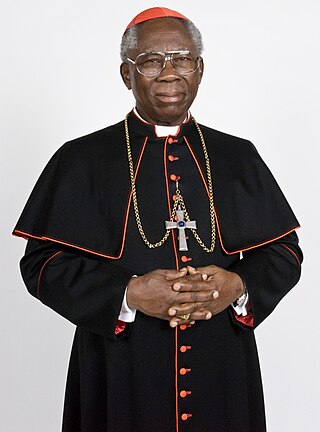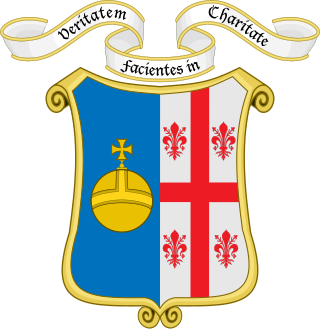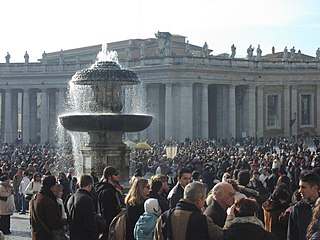The Roman Curia comprises the administrative institutions of the Holy See and the central body through which the affairs of the Roman Catholic Church are conducted. The Roman Curia is the institution which the Roman Pontiff ordinarily makes use of in the exercise of his supreme pastoral office and universal mission in the world. It is at the service of the Pope, successor of Peter, and of the Bishops, successors of the Apostles, according to the modalities that are proper to the nature of each one, fulfilling their function with an evangelical spirit, working for the good and at the service of communion, unity and edification of the Universal Church and attending to the demands of the world in which the Church is called to fulfill its mission.

The Mass of Paul VI, also known as the Ordinary Form or Novus Ordo, is the most commonly used liturgy in the Catholic Church. It was promulgated by Pope Paul VI in 1969 and its liturgical books were published in 1970; those books were then revised in 1975, they were revised again by Pope John Paul II in 2000, and a third revision was published in 2002.

Francis Arinze is a Nigerian cardinal of the Catholic Church. He was Prefect of the Congregation for Divine Worship and the Discipline of the Sacraments from 2002 to 2008 and before that led the Secretariat for Non-Christians from 1984 to 2002.
The Chinese Regional Bishops' Conference, is the episcopal conference of Taiwan and is the highest organ of the Roman Catholic Church in Greater China. Catholics in the independent jurisdictions of Hong Kong, Macau and Mongolia are represented in the Federation of Asian Bishops' Conferences, not the Chinese Regional Bishops' Conference.

The Catholic Church in South Africa is part of the worldwide Catholic Church composed of the Latin Church and 23 Eastern Catholic Churches, of which the South African church is under the spiritual leadership of the Southern African Catholic Bishops Conference and the Pope in Rome. It is made up of 26 dioceses and archdioceses plus an apostolic vicariate.

The Institute of Christ the King Sovereign Priest, Latin: Institutum Christi Regis Summi Sacerdotis, abbreviated as ICRSS and ICKSP, is a society of apostolic life of pontifical right in communion with the Holy See of the Catholic Church. The institute has the stated goal of honouring God and the sanctification of priests in the service of the Catholic Church and souls. An integral part of the institute's charism is the use of the traditional liturgy, namely the Missal of John XXIII for Mass, the Breviary of John XXIII for the Divine Office, and the Rituale Romanum for other sacraments. The society has undertaken the restoration of a number of historic church buildings.
Denis Eugene Hurley OMSG was the South African Roman Catholic Vicar Apostolic of Natal and Bishop, and later Archbishop of Durban, from 1946 until 1992. He was born in Cape Town and spent his early years on Robben Island, where his father was the lighthouse keeper. In 1951, Hurley was appointed Archbishop of Durban and the youngest archbishop in the world at that time.
Based in Bogotá (Colombia), the Latin American and Caribbean Episcopal Council, better known as CELAM, is a council of the Roman Catholic bishops of Latin America, created in 1955 in Rio de Janeiro, Brazil.
In the Catholic Church, a parish is a stable community of the faithful within a particular church, whose pastoral care has been entrusted to a parish priest, under the authority of the diocesan bishop. It is the lowest ecclesiastical subdivision in the Catholic episcopal polity, and the primary constituent unit of a diocese or eparchy. Parishes are extant in both the Latin and Eastern Catholic Churches. In the 1983 Code of Canon Law, parishes are constituted under cc. 515–552, entitled "Parishes, Pastors, and Parochial Vicars."

The Croatian Bishops' Conference (HBK) is an episcopal conference of the Catholic Church in Croatia. The Conference was founded on May 15, 1993 after Croatia regained its independence after the breakup of Yugoslavia in the early 1990s, which consequentially led to the abolition of the Bishops' Conference of Yugoslavia. HBK is composed of all active and retired bishops; currently 32.

Catholic laity are the ordinary members of the Catholic Church who are neither clergy nor recipients of Holy Orders or vowed to life in a religious order or congregation. Their mission, according to the Second Vatican Council, is to "sanctify the world".

The Australian Catholic Bishops’ Conference (ACBC) is the national episcopal conference of the Catholic bishops of Australia and is the instrumentality used by the Australian Catholic bishops to act nationally and address issues of national significance. Formation of the ACBC was approved by the Holy See on 21 June 1966. With around 5.4 million Catholics in Australia, the ACBC is an influential national body.

The Czech Bishops' Conference (CBC) is the standing episcopal conference of the Catholic bishops of the Czech Republic. Based in Prague, the CBC represents the Catholic Church in the Czech Republic. It was founded in early 1993, the date of independence for the Czech Republic, as the successor to the Czechoslovak Bishops' Conference. Members of the Bishops' Conference according to canon 447 CIC: in conjunction perform pastoral duties in favor of the Christians in their territory, to achieve the greater good which the Church gives to people according to law, especially apostolic actions suitably adapted to the time and place. The Episcopal Church of the conference is a legal entity run by the Apostolic See, its character and activities are governed by the 1983 Code of Canon Law, specifically canons 447-459. Members of the Czech Bishops' Conference are diocesan bishops of Latin Church and Eastern Catholic Churches, and position them on an equal footing with auxiliary bishops and other titular bishops both within or outside for the Czech Republic and perform specific tasks under a mandate from the Holy See or the Czech Bishops' Conference.

The Spanish Episcopal Conference is an administrative institution composed of all the bishops of the dioceses of Spain and Andorra, in communion with the Roman Pontiff and under his authority. Its purpose is the joint exercise certain pastoral functions of the episcopate on the faithful of their territory, under common law and statutes, in order to promote the life of the Church, to strengthen its mission of evangelization and respond more effectively to the greater good that the Church should seek to men.

The Bishops' Conference of the Netherlands is a permanent body within the Roman Catholic Church in the Netherlands which determines policies and directs the apostolic mission within the Netherlands. It is governed by bishops from around the country.

Lithuanian Bishops' Conference is the official meeting of Catholic bishops in Lithuania. It has its seat in Vilnius. The Episcopal Conference is a member of the Council of European Episcopal Conferences (CCEE) and the Commission of the Bishops' Conferences of the European Community (COMECE).
The Regional Episcopal Conference of Francophone West Africa is an agency of the Catholic Church which includes the bishops of Western Africa.
The Kenya Conference of Catholic Bishops (KCCB) is the assembly of bishops of the Catholic Church in Kenya. Its statutes were approved by the Holy See on December 7, 1976.
The Tanzania Episcopal Conference (TEC) is the conference of bishops of the Roman Catholic Church in Tanzania. Founded in 1956, the Episcopal Conference was officially recognized by the government in 1957. It includes all the Catholic bishops of the country, ordinary, and auxiliary emeritus. Its headquarters is located in the capital Dar es Salaam. The statutes of the Conference were approved by the Holy See on January 8, 1980.

The Catholic Bishops' Conference of Japan, also abbreviated as the CBCJ, is the Catholic episcopal conference of Japan, representing predominantly the members of the Latin Japanese Catholic Church. It was founded as the Nippon Tenshu Kokyo Kyodan. After the implementation and execution of the Religious Corporations Act, the body was renamed the CBCJ, becoming a religious corporation as classified under Japanese law.











